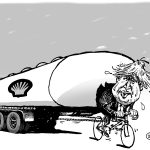The Green momentum
More than ever, climate change is on the agenda. Investors intend to contribute. Will they have a decisive influence?
The confinement reduced the “earth overshoot day” by three weeks. However, as experts point out, this forced reduction in greenhouse gas emissions is neither ecologically structural nor economically sustainable. At the same time, the period confronted us with our own contradictions, and for climate defenders, new “provocations” have emerged increased production of disposable plastics, masks containing non-biodegradable materials, postponement of emission restrictions measures etc. This period only reinforced the need to meet environmental commitments and the preservation of biodiversity, in order to contain future health and climate risks.
The European Commission has placed its recovery plan under this dual objective of the environment and social cohesion.
Keeping the commitments of COP21 therefore remains a collective challenge. Governments are doing this especially in Europe, where most recovery plans will revolve around low carbon strategies, environmental protection, while promoting activity and employment. We should see the deployment of transport, regional planning and habitat renovation policies in line with these commitments. The European Commission has also placed its recovery plan under this dual objective of the environment and social cohesion.
On the investor side, participation in the joint effort is also being organized. It responds to a desire that is increasingly shared by savers to see their funds used “wisely”. The rise of ESG 1 themes is witness to this. Thus, under the UN initiative, an alliance of institutional investors named “net zero asset owner alliance” was formed which set itself the objective of aligning its investment portfolios with a view to containing the increase in temperature 1.5 ° above the benchmark averages by 2050, as stipulated by the Paris Agreements.
The funds concerned represent around 4,7 trillion dollars and its initiators are essentially insurers and reinsurers, pension and retirement funds, private, public and semi-public, mostly European and Canadian.
The aim is to conduct a so-called responsible and sustainable investment policy with the objective of “decarbonizing” portfolios, by selecting the companies that have adopted such strategies or by influencing the sectors they target through their equity investments.
Getting out of the climate versus decay equation will certainly require a boost.
Will this initial power have a sufficient ripple effect? Some still doubt it. The amounts stated represent in fact only a tiny part of the total stock of global savings. Similarly, how can the most influential – and most polluting – countries be engaged when the United States has withdrawn from COP21 and China still relies heavily on coal, and many emerging countries are facing economic emergencies, which the pandemic has only aggravated?
From the point of view of investors, large private groups are promoting these approaches. This is the case of the manager BlackRock, who announced last January that he would commit to sustainable investment. On March 26, the Parliament and the European Commission have agreed on the creation of a first reference and classification system for sustainable economic activities called taxonomy. By developing recognized and reliable criteria, the authorities make more transparent means of selection available to investors and savers.
The fact remains that after the COVID-19 crisis, public resources have become scarce and international coordination has diminished. Getting out of the climate versus decay equation will certainly require a boost.
Published in Allnews.ch June 22nd. Cartoon by Barret
1 ESG, Environmental, Societal, Governance



